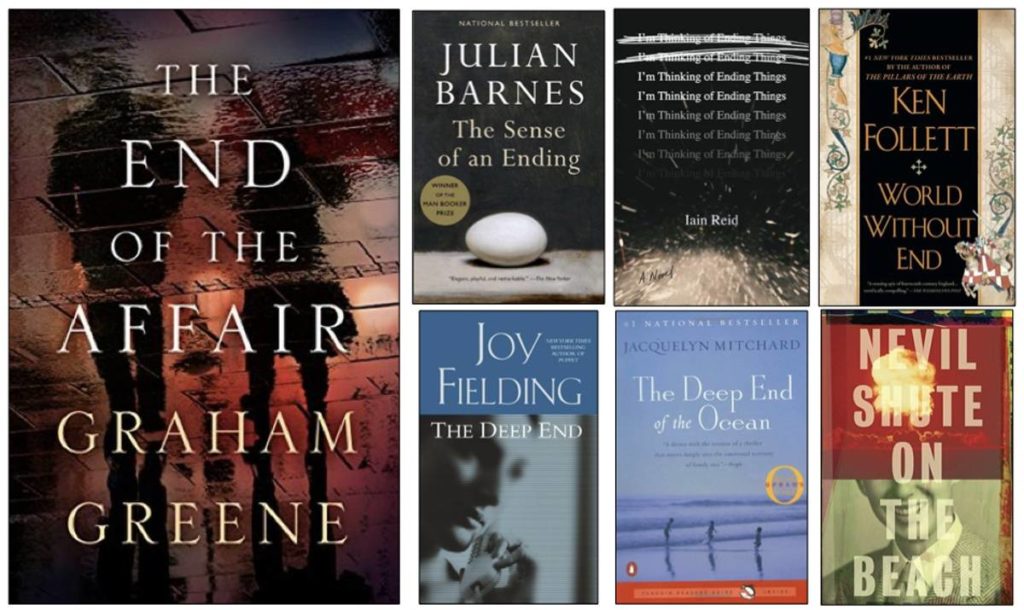It’s time for another adventure in Kate’s 6 Degrees of Separation Meme from her blog, Books Are My Favourite and Best. We are given a book to start with, and from there we free associate six books.
This month’s starting point is The End of the Affair by Graham Greene. About 35 years ago I tried to read a couple of Greene’s novels, The Quiet American and Our Man in Havana. I didn’t get very far in either one. I kept waiting for something to happen.
For this month’s 6 Degrees, I took on The End of the Affair. I did make it to the bitter end, but only out of a sense of obligation, for two reasons: (1) I thought I should finish it for this exercise, and (2) I can now finally say that I’ve read a book by Graham Greene.
I know that I SHOULD like The End of the Affair because it emphasizes Literature & Psychology. But I like more action with my psychology. Here are some other ends that I prefer over Greene’s.
1. Reading The End of the Affair reminded me that The Sense of an Ending by Julian Barnes has been waiting patiently on my TBR shelf for ever so long. I found this book much more satisfying that Greene’s. Much of the action of Barnes’s novel occurs within the head of the first-person narrator as events of his late life force him to re-examine his actions during a formative period of his early adulthood. And that re-examination causes him to take action.
2. Thinking about Barnes’s novel got me thinking again about I’m Thinking of Ending Things by Iain Reid, a book that I read in the fall of 2020. This novel takes place almost completely within the head of its protagonist. But a lot of stuff goes on in there.
3. In contrast to these first two novels, World Without End, the second book in Ken Follett’s Kingsbridge trilogy (after The Pillars of the Earth), takes place in the wide world of Europe as new cultural ideas emerge and threaten to displace traditional beliefs in areas such as religion, medicine, and commerce.
4. Protagonist Joanne Hunter’s world starts to unravel inThe Deep End by Joy Fielding. Her husband of 20 years requests some time to “think things over,” her grandfather lies ill in a nursing home, her kids are acting like typical angst-ridden teenagers—and then she begins to get mysterious, threatening phone calls. Joy Fielding usually tells a compelling, suspenseful story. This is not one of her best books, but it does contain that word end in the title. And things certainly do happen.
5. Jacquelyn Mitchard’s debut novel The Deep End of the Ocean (1996) tells the story of a family dealing with the loss of their kidnapped 3-year-old son. This is the novel Oprah chose when she introduced her original book club back in 1997. Does this fact make The Deep End of the Ocean an end that is also a beginning?
6. The final selection, On the Beach by Nevil Shute, does not have the word end in its title, but its subject matter is the mother of all ends: the end of human life on earth. As a cloud of nuclear radiation slowly creeps from the northern hemisphere to the southern, residents around Melbourne, Australia, face their inevitable individual ends in their own ways.
Let me end this discussion of ends by saying that On the Beach is not as grim as this short description sounds. Yes, the ending it describes is definitively drastic, but most of the characters face it in their own quietly heroic ways. I reread this novel during COVID after having read it in high school more than 50 years ago and was actually uplifted by how the characters reacted to their grimly inevitable situation.
—The End—
© 2022 by Mary Daniels Brown


Maybe I should reread On the Beach. I read it as a child in school and it terrified me – but then, I was of the Cold War generation when we thought nuclear war was imminent… to think that we are living through that fear again.
I, too, am of the Cold War generation, MarinaSofia, which I imagine is probably why I didn’t remember how the characters reacted, only THE END OF THE WORLD!
Woo hoo, I’ve read two of yours – Barnes and Shute – and have heard of Mitchard’s. I haven’t read The end of the affair but lack of action would not put me off. Actually, it would probably encourage me, though perhaps it depends on what you mean by “action”?
Most of what happens in End of the Affair is the narrator philosophizing with God (in whom he doesn’t believe) about why his married lover ended her affair with him. So by “action” I mean just about anything else.